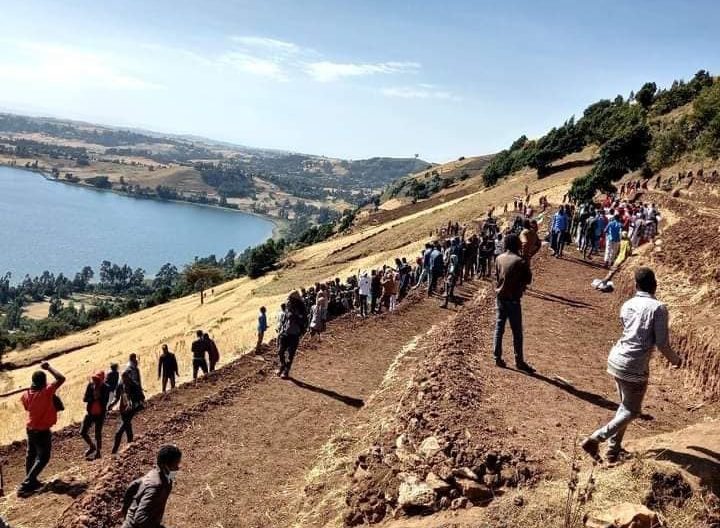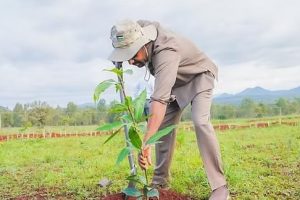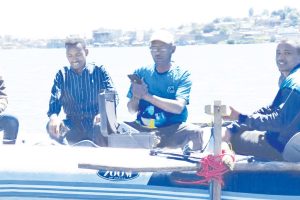
Horns of African countries are facing one of the highest levels of drought in decades. As the drought is outcome of, among other things, natural resource degradation, people in their neighborhoods are intensifying efforts to counter the threat.
Ethiopia has built the culture of voluntary environmental protection service culture during January and February months. During these two months, the rural population across the country always mobilizes in groups to protect the environment through terrace works, soil and water conservation and environmental protection activities including preparing land for the next plantation seasons.
For decades, this environmental protection voluntary service culture has continued and saved millions of hectares mainly in the highlands of the country. The working age group, all men and women above 18, always participated in the annual environmental protection mass mobilization campaign.
As part of this annual environmental protection voluntary service culture, Amhara and Oromia launched this year’s environmental protection work throughout the two regional states aiming at rehabilitating affected areas, to protect basin areas and to protect the ecology from damages by investing on the protection mechanisms.
At national level, Ethiopia plans to cover over 2.5 million hectares of land with the annual free service environmental protection campaign. As the country gives due attention to green development and agricultural productivity to substitute imported agricultural products mainly wheat, this year’s annual environmental protection and water and soil conservation works to support these national efforts.
During the annual integrated environmental protection and water and soil conservation campaign in Libokemkem Woreda in Southern Gonder Zone of Amhara State, Natural Resource and Food Security State Minister, Professor Eyasu Elias said that this year’s integrated environmental protection campaign is unique as it is practicing after the liberating of the state from TPLF forces. This environmental protection campaign at this critical time is an indicator that Ethiopia gives due attention to fighting poverty under any circumstance.
The State Minister noted that Ethiopia is working to substitute wheat import with local production by investing on expanding summer irrigation. To achieve this target and for sustainability of agricultural productivity that is still dependent on nature, environmental protection is key and basic issue. Prof. Eyasu added that during this year’s annual integrated environmental protection national campaign, over 2.5 million hectares of land is planned to be covered by the rehabilitation, protection and conservation efforts.
According to him the activities focus on maintenance of the previous year’s works, building new terraces and watersheds and preparing land for the upcoming plantation season.
Oromia launched the annual water and soil conservation free service campaign last week. Briefing journalists on the 60 days valley development and environmental protection activities in the regional state, Oromia Agriculture Bureau head said that soil and water conservation, watershed development activities and other environmental protection activities will be carried out in the next 60 days to rehabilitate degraded and affected areas throughout Oromia.
Bureau head, Abera Worku noted that this year’s environmental protection campaign gives due attention to basin and valley developments to protect the area from erosion and flooding as well as harvesting water. To properly implement the terrace, watersheds and other environmental protection and rehabilitation activities, 1 thousand 141 experts were trained for this purposes assigned for every zone, woredas and kebelle administrations to support and lead the environmental protection activities with knowledge.
According to Abera Ethiopia is struggling to develop its agricultural productivity since it is the backbone of the country’s economy. By investing on wheat productivity, Ethiopia is working to substitute imported wheat with local product. Abera said that this year’s environmental protection state-wide campaign would focus on supporting the country’s agricultural productivity by protecting the environment and the ecology.
Abera noted that millions of people across Oromia would participate in the annual environmental protection and water and soil conservation campaign throughout Oromia. The environmental protection, rehabilitation and conservation activities are started in all 21 zonal administrations of the region, according to the bureau.
On the occasion of the annual public environmental protection and conservation campaign, Oromia State President, Shimelis Abdisa urged the people of Oromia to participate in this annual nature protection culture to save their surroundings ecology. Shimelis on his message stated that “Oromia is rich in natural resources; we have to protect and save it to the next generation with additional investment in our beautiful nature.”
According to Shimelis Oromia is endowed with a good culture of protection and caring for nature by its Gada System. “The people of Oromo are aware of the relationship between human beings and nature” Oromia President Shimelis noted on his statement adding “human beings have to keep the balance of nature for their survival.” Conserving nature is a mandatory duty for human beings for the continuity of their generation and to control global warming, he added.
According to President Shimelis Oromo is known for its culture of protecting the natural balance and take care of its surroundings. “Cutting tree illegally is a shameful act as per the custom of Gada, Oromo protects all creature in the forest not only forest. In this way, Oromo is known in protecting natural balance that is good for life,” he added.
“Though, this tradition has not vanished it has somehow declined compared to the past. We are becoming cruel to nature and nature is becoming cruel to us,” Shimelis underlined. Shimelis stated that during the past three plantation seasons, Oromia planted over 9.4 billion trees and preparing to plant 4.5 billion new seedlings in the coming rainy plantation season. All these efforts are to protect nature in the region.
In addition to planting trees and protecting the available nature, the annual environmental protection and conservation activities are playing to protect nature mainly by rehabilitating affected areas through terrace and watershed developments. Hence, the president calls the people of Oromia to massively engage in the national environmental protection and conservation service.
Oromia Agriculture Bureau head Abera added that in addition to the rural population, 19 urban administrations have mobilized their residents in this year’s campaign. According to him, over one million kilometer land is planned to protect from soil erosion by building terraces.
According to the Bureau, the basin development work in Oromia is planned to cover over 6, 448 basins.
Amhara State also stated that this year’s summer natural resource protection campaign is already started throughout the state last week. Natural Resource Development and Conservation Director at Amhara Agriculture Bureau, Esmelealem Mihretu told ENA that the natural resource development and protection work of this year gives due attention to 8, 429 basins in the regional state.
Esmelealem stated that in Amhara state, the environmental protection and water and soil conservation works of this year are scheduled to cover over 331 thousand hectares of land. He added that 222 thousand hectare is scheduled to be covered with new water and soil conservation and terrace works while over 109 thousand hectare for maintenance activities that were implemented during the past conservation years.
The director further noted that throughout the two months protection and conservation period, over 4.3 million people are expected to participate in the campaign. Vice President of Amhara State, Getachew Jember (PhD) on his part noted that the people of the state should actively participate in protecting its environment by working different conservational activities to help the country’s agricultural productivity.
Summer environmental protection, water and soil conservation campaigns are started and mobilizing the people to this annual environmental protection culture.
BY DARGIE KAHSAY
THE ETHIOPIAN HERALD TUESDAY 18 JANUARY 2022





